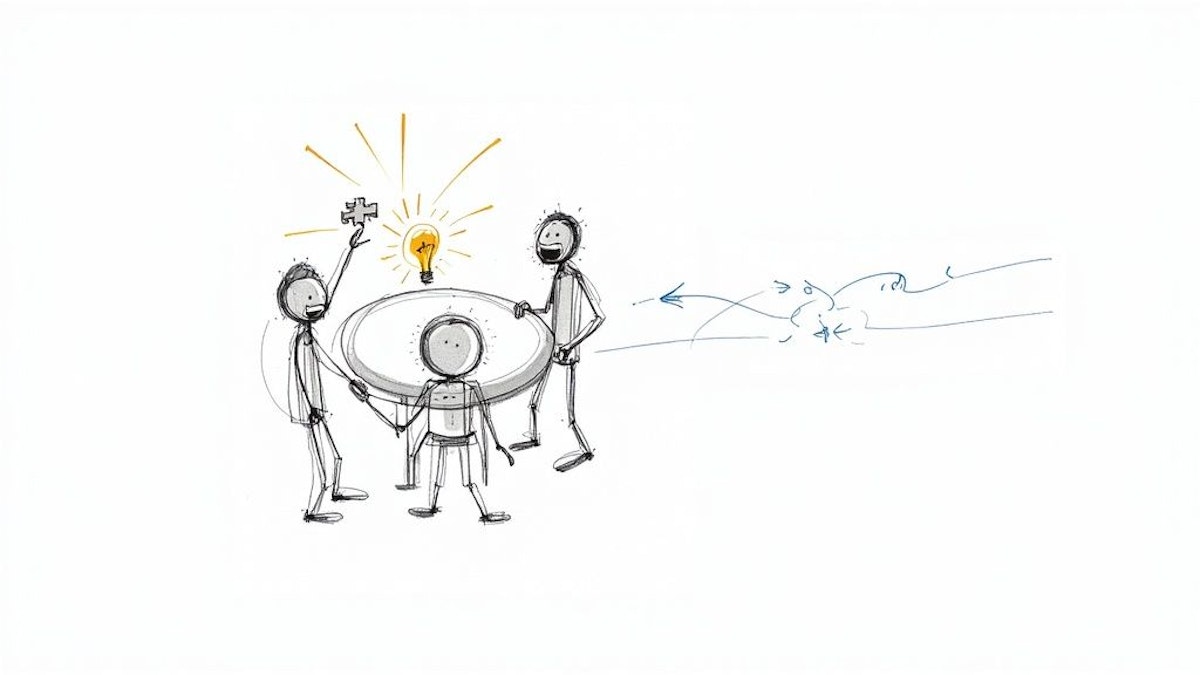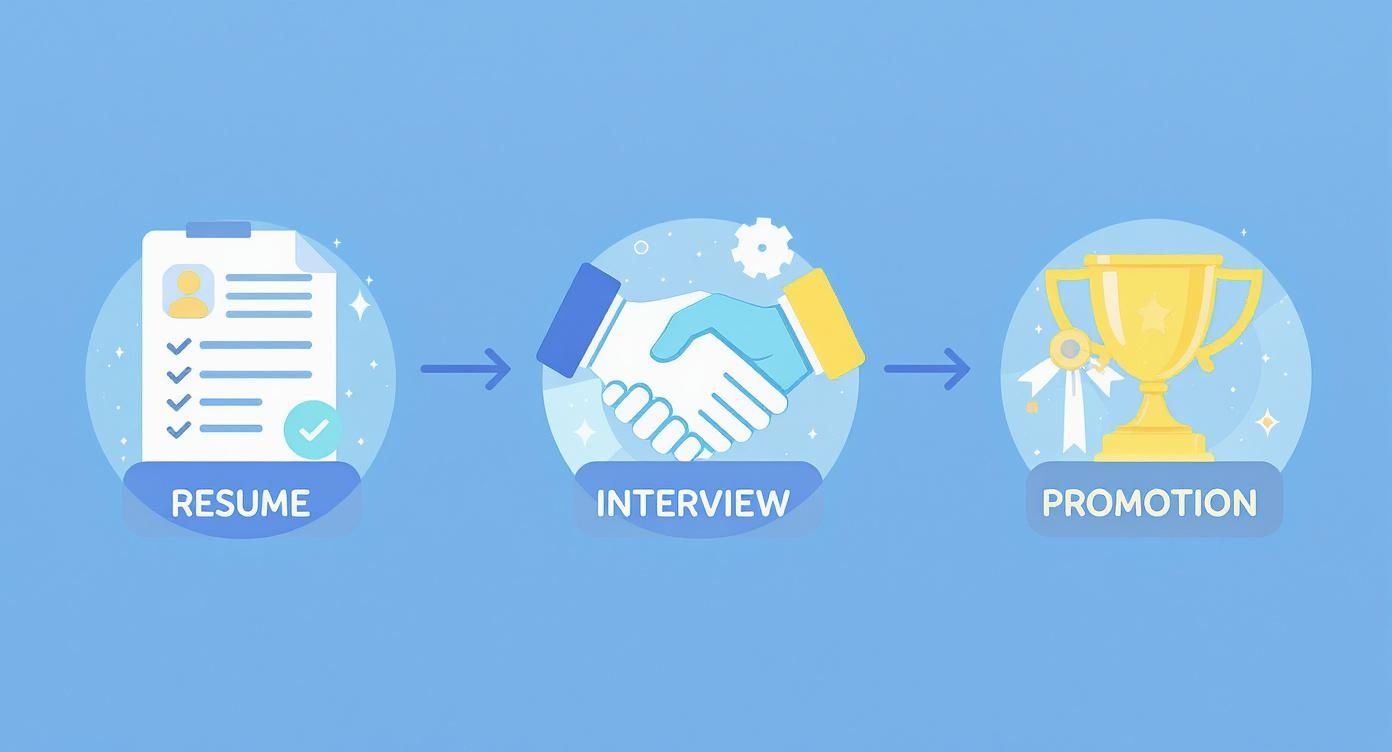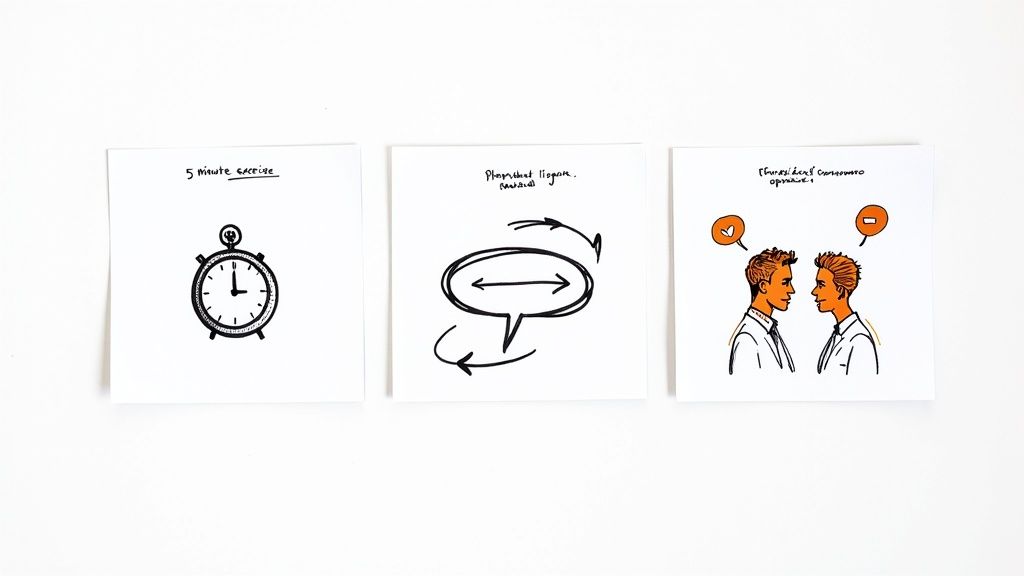How to Develop Soft Skills: A Practical Guide

You can’t just decide to be a better communicator or a more adaptable team member. Real soft skill development is a hands-on process. It’s about taking a hard look at where you stand, practicing new approaches in real situations, and getting honest feedback to see what’s working.
This isn't about changing who you are. It's about fine-tuning how you connect, work with others, and ultimately, lead.
Why Soft Skills Define Your Career Trajectory
Sure, your technical skills get you in the door. They get your resume past the first filter. But it's your soft skills that will actually build your career, earn you promotions, and win you respect over the long haul.
Think about it. Your ability to communicate clearly, show genuine empathy, bounce back from setbacks, and collaborate effectively—these are the real engines of professional success. They're what determine how well you can turn your technical knowledge into real-world results as part of a team.
Here’s a common scenario: two candidates are up for the same competitive job. Both have identical qualifications on paper. The first one gives technically perfect answers to every question. The second one does that too, but also actively listens, builds a genuine rapport with the interviewers, and clearly explains how they’d navigate a team conflict with empathy.
Who gets the job? The one who didn't just answer questions, but demonstrated they could fit in, influence others, and genuinely contribute to the team's culture.
The Undeniable Business Case for Soft Skills
This isn't just a hunch; the numbers back it up. The demand for soft skills is reshaping the entire professional landscape. According to a report by Research and Markets, the global market for soft skills training was valued at $29.8 billion in 2023 and is projected to reach $83.5 billion by 2032.
Why the explosive growth? A study by the National Soft Skills Association found that 85% of job success comes directly from well-honed soft skills. Businesses that invest in this kind of training even see a 26% increase in revenue growth, as reported by the Association for Talent Development (ATD), showing a crystal-clear return. If you want to see more stats on this, check out the data on passivesecrets.com.
These abilities are no longer just "nice-to-haves." They are the core competencies that separate average performers from indispensable team members. In a world where automation can handle routine tasks, your uniquely human skills are your greatest professional asset.
This link between people skills and performance isn't just a business trend; it's grounded in psychology. Many of these crucial skills are directly tied to how well you understand and manage emotions—both your own and those of the people around you.
If you want to go deeper into the science behind this, it’s worth exploring the foundational theories of emotional intelligence to see how they play out at work. At the end of the day, investing in your soft skills is a direct investment in your future earning potential and overall career happiness.
Creating Your Personal Soft Skills Blueprint
Before you can really dig into improving your soft skills, you have to get an honest read on where you are right now. It's one thing to say, "I need to be a better communicator," but it’s another to have a focused plan. The goal here isn't to pick yourself apart; it's to find the 2-3 skills that will give your career the biggest leg-up at this moment.
A great starting point is to conduct a personal self-assessment. Think of it like using a skills gap analysis template to find the real opportunities for growth. This helps you get past vague feelings and build a plan based on actual evidence.
This whole process really shines a light on how crucial these skills are at every step of your career, from landing the interview to getting that next promotion.

As you can see, a solid resume might get your foot in the door, but moving up the ladder is almost entirely about how well you work with others.
Pinpoint Your Strengths and Blind Spots
Let's be real—any meaningful growth starts with honest self-reflection. The best place to begin is by looking back over your recent work. Think about the projects that flew and the ones that flopped. What patterns do you see?
What you're trying to do is connect a specific behavior to an outcome. For instance, did that project succeed because you were crystal clear in your communications, keeping everyone on the same page? Or did a deadline slip because of shaky time management or a reluctance to delegate tasks?
To get your thoughts flowing, try asking yourself these questions:
- What feedback have I gotten over the last year? I’m talking about everything—comments in performance reviews, off-the-cuff remarks from colleagues, or feedback from clients.
- When did I feel most on top of my game at work? Pinpoint what skills you were using in those moments of peak confidence.
- What situations consistently stress me out? This is often a huge clue. Frustration can point directly to an underdeveloped skill, like navigating conflict or adapting to unexpected changes.
Solicit Genuinely Useful Feedback
Looking inward is a fantastic start, but we all have blind spots. It's just human nature. A study published by the National Soft Skills Association highlighted that 85% of job success boils down to well-honed soft skills, yet many of us overestimate our abilities. This is exactly why getting an outside perspective is non-negotiable.
Turn to mentors, managers, or peers you genuinely trust. But don't just ask them, "What can I improve on?" That's way too vague and puts them on the spot. Instead, you need to ask targeted questions that will get you specific, actionable advice.
Try framing it this way: "I'm really focused on making our meetings more effective. In that last project sync, is there anything I could have done to make the discussion more productive for everyone?" This kind of question invites concrete suggestions, not just empty compliments.
Here’s another one I like: "When you think about the best people you've ever collaborated with, what's one quality they had that you think I could work on?" This frames the feedback in a positive, aspirational way, focusing on role models rather than just your flaws. Remember, what you're building is a personal development map that feels inspiring, not like a list of everything you're doing wrong.
Practical Exercises to Build In-Demand Soft Skills

Knowing which soft skills matter is the easy part. The real challenge—and where genuine growth happens—is putting that knowledge into practice. This isn't about some grand, sweeping overhaul of your personality. It's about small, consistent actions that, over time, become second nature.
The best way to do this is by weaving simple exercises into your daily grind. You can turn routine conversations and team meetings into powerful training grounds. The key is to start small and focus on things you can do right now.
Mastering Persuasive Communication
Let's be honest, vague advice like "be a better listener" is useless. What does that even mean in a practical sense? You need a concrete technique you can actually use.
Try this: the next time you're in a meeting and a colleague shares an idea, use the playback technique. Before you jump in with your own opinion, take a moment to summarize their point back to them.
Start with something like, "Okay, so if I'm hearing you right, you're suggesting we..."
This tiny shift does two brilliant things at once. First, it instantly clarifies that you're on the same page, nipping potential misunderstandings in the bud. Second, it makes your colleague feel genuinely heard, which is a massive trust-builder. It's a skill that's especially powerful in interviews, where you'll be faced with all sorts of interview questions for interpersonal skills designed to test this very thing.
Enhancing Collaboration and Teamwork
Nothing creates friction on a team faster than poorly delivered feedback. When feedback feels like a personal attack instead of a constructive comment, collaboration grinds to a halt.
To avoid this, I always recommend the Situation-Behavior-Impact (SBI) model. It’s a dead-simple framework that takes the emotion and judgment out of the conversation.
- Situation: First, set the scene. ("In yesterday's client presentation...")
- Behavior: Next, describe the specific, observable action. No opinions, just facts. ("...when you clicked through the Q3 data slides, you went through them very quickly.")
- Impact: Finally, explain the result. ("...I noticed the client looked a bit lost, and we ended up getting several questions about figures we'd already covered.")
See how that works? It’s not about blame. It’s about connecting an action to an outcome. You’re not saying "You were bad"; you're saying "This happened, and here was the result." This transforms a tense confrontation into a productive coaching moment.
The professional world is shifting. According to the World Economic Forum’s Future of Jobs Report 2023, skills like analytical thinking and creative thinking are now top-of-the-list for employers. This isn't just a trend; it's a fundamental change in what it means to be a valuable employee.
Building Genuine Adaptability
Adaptability isn't about just rolling with the punches. It's about how you think when those punches come. A sudden project change or a surprise deadline can throw anyone off their game. The trick is to reframe these moments from being problems into being puzzles.
The next time you're hit with an unexpected change, stop and ask yourself one simple question: "What does this make possible?"
This isn't about toxic positivity. It's a strategic mental shift. A project deadline getting moved up might make it possible to ruthlessly simplify a feature you were over-engineering. A key team member leaving might make it possible for a junior employee to step up and shine.
This single question forces your brain to switch from reactive frustration to proactive problem-solving. As you get better at this, you'll find that strengthening your ability to how to develop analytical skills makes it even easier to see the hidden opportunities in any disruption.
To get you started, here is a quick-reference table with some of the most critical soft skills and a simple, actionable exercise for each.
Action Plan for Top In-Demand Soft Skills
| Soft Skill | Why It's Critical | One Actionable Practice |
|---|---|---|
| Active Listening | Builds trust, reduces misunderstandings, and fosters stronger relationships. | Use the playback technique in your next meeting: "What I'm hearing is..." to confirm understanding before responding. |
| Giving Feedback | Drives team improvement and creates a culture of psychological safety. | Frame your next piece of constructive feedback using the Situation-Behavior-Impact (SBI) model to keep it objective and actionable. |
| Adaptability | Enables you to navigate uncertainty and find opportunities in change. | When a plan goes wrong this week, ask yourself "What does this make possible?" to shift your mindset from problem-focused to solution-focused. |
| Emotional Intelligence | Helps you manage your own emotions and understand the emotions of others. | At the end of each day, identify one emotion you felt strongly and what triggered it. This simple self-awareness is the foundation of EQ. |
| Problem-Solving | Turns you into the go-to person for finding solutions, not just pointing out issues. | Before escalating a problem to your manager, brainstorm and bring three potential solutions with you. |
This table isn’t an exhaustive list, but it's a launchpad. Pick one skill and focus on that single action for a week. You’ll be surprised at how quickly these small, deliberate practices start to build the professional habits that truly set you apart.
Putting Your Skills to the Test in the Real World
Knowing the theory behind soft skills is one thing, but true mastery happens in the messy, unpredictable flow of a real workday. It’s during those tense meetings, tight deadlines, and tough conversations that practice truly turns into proficiency. The trick is to stop seeing skill development as a separate to-do list item and start weaving it into the fabric of your daily work.
Think about it: your professional life is just one big series of opportunities. That tricky client negotiation isn't just a hurdle to clear; it's a live workshop for flexing your empathy and creative problem-solving muscles. That all-hands presentation coming up? It’s a perfect, low-stakes stage to build your public speaking confidence. When you reframe these everyday situations, your job becomes the most effective practice field you could ask for.
Turn Daily Interactions into a Training Ground
Every conversation, email, and meeting is a chance to get a little bit better. Instead of just going through the motions, approach your day with a clear intention. Before you walk into your next team sync, pick one small, specific goal.
For instance, you could decide to:
- Practice active listening: Make a conscious effort not to interrupt. Try to paraphrase what someone said at least once to confirm you've got it right.
- Encourage collaboration: Proactively ask for the opinion of a quieter team member. It’s a simple way to make the conversation more inclusive.
- Navigate conflict: If a disagreement pops up, steer the conversation toward the root cause instead of getting stuck on the surface-level argument.
This doesn't take much extra time, but the payoff is huge. It’s all about being present and purposeful in moments that might otherwise just drift by. These small, consistent efforts are what build the muscle memory you need to handle complex interpersonal situations with ease.
Find a Sparring Partner for On-the-Spot Feedback
Self-reflection is great, but we all have blind spots. One of the fastest ways to grow is to find a "sparring partner"—a trusted colleague who can give you honest feedback in the moment. This isn't a formal mentor, just a peer you have a good rapport with.
The idea is simple: you both agree to offer immediate, constructive feedback. After a client call, your partner might pull you aside and say, "You explained the technical side brilliantly, but I think the client got a little lost. Maybe next time, we could lead with a simple analogy?"
This kind of instant, contextual feedback is pure gold. You can’t fix what you can’t see. A sparring partner acts as a mirror, helping you spot the little behavioral tics or communication habits that might be holding you back without you even realizing it. According to the National Soft Skills Association, this external perspective is critical since 85% of job success is tied to well-developed soft skills that are difficult to self-assess accurately.
This is especially critical if you're in a leadership position. Building strong people skills for managers isn't just about your own career; it directly impacts your team's morale, productivity, and even how long they stick around. A trusted peer can offer the candid insights you need to sharpen your leadership style. Ultimately, learning how to develop soft skills effectively means getting out of the textbook and into the hands-on practice your job offers every single day.
Tracking Your Progress and Proving Your Growth

It feels great to work on your soft skills, but how do you actually know if you’re getting better? It's not like you get a certificate for becoming a better listener. This is where most people get stuck. But here’s the thing: tracking your growth is not only possible, it’s what keeps you motivated to continue.
The trick is to stop thinking in abstract terms like "I want to improve my communication." Instead, you need to reframe it as a project with concrete, measurable outcomes. This shift is crucial. According to a 2023 report from America Succeeds, 93% of employers say soft skills are an essential or very important factor in their hiring decisions, so being able to show tangible progress is a huge career advantage.
From Vague Goals to Tangible Metrics
To track your progress, you first need to define what success actually looks like in your day-to-day job. It’s all about connecting the soft skill you’re developing to a key performance indicator (KPI) you can actually count. This takes the guesswork out of the equation and turns your development into a data-driven effort.
Let's look at a few real-world examples of how this works:
- Instead of: Getting better at conflict resolution.
- Try This: Reduce the number of team disagreements that need a manager's help by 50% this quarter.
- Instead of: Improving my communication.
- Try This: Cut down on the number of "just clarifying" emails I get about my projects by 25% in the next two months.
- Instead of: Working on my time management.
- Try This: Deliver 90% of my project milestones on or ahead of schedule for the next six months.
When you set specific targets like these, you create a clear benchmark for yourself. You can look back in a few months and see undeniable proof of how far you’ve come—something incredibly valuable come performance review time.
Using a Journal for Qualitative Insights
Metrics and numbers only tell half the story. To really understand the how and why behind your progress, a simple journaling habit is one of the most powerful tools you can use. I’m not talking about writing pages every day. This is about quick, focused reflection.
Take five minutes after a challenging client call, a tense team meeting, or a presentation that went really well. Jot down what happened, how you reacted, and what you’d do differently next time. This practice helps you spot behavioral patterns and celebrate the small wins you might otherwise forget.
For example, you might note a time you successfully used a listening technique to de-escalate a misunderstanding with a coworker. Over time, these entries become a rich log of your behavioral shifts and proof of how to develop soft skills in real-world scenarios.
This kind of self-awareness is also the first step in figuring out which skills need the most work. To get a clearer picture of where you stand, you might explore a communication skills assessment test, which can offer a more structured look at your strengths. Combining hard data with these personal reflections gives you a complete picture of your journey, providing both the confidence and the evidence to prove your growth to anyone.
Your Soft Skill Development Questions, Answered
Embarking on any kind of personal growth journey naturally brings up a few questions. When it comes to sharpening your soft skills, you might wonder where to even begin or how long it'll take before you actually feel a change. Let's tackle some of the most common questions head-on.
Think of this as your practical guide to getting started, staying motivated, and sidestepping those all-too-common roadblocks.
Which Soft Skill Should I Focus on First?
My advice is always to pick the one skill that will give you the biggest, most immediate win in your current role. For a lot of people, that’s communication, simply because it’s the bedrock for almost every other interpersonal skill. But honestly, the "right" answer always depends on your specific situation.
Go back to the self-assessment you did earlier. Find a weak spot that directly impacts your day-to-day work. For example, if you're constantly juggling shifting project deadlines and priorities, adaptability is probably your golden ticket. By zeroing in on one high-impact skill, you avoid getting overwhelmed and start seeing real, motivating progress right away.
How Long Does It Take to See Real Improvement?
There's no set-in-stone timeline, but with dedicated, intentional practice, you should start noticing a real difference within 3 to 6 months. This isn't like learning a new software program where you can just memorize functions. Developing a soft skill is about rewiring your ingrained habits, and that requires time and a whole lot of repetition.
The secret sauce is consistency. Making small efforts every day is infinitely more powerful than a single, grand gesture. Practicing active listening in every single meeting, for instance, will do more for you than a one-day workshop you forget about by Tuesday.
Keeping a simple journal to track your small wins can be a game-changer. It makes your progress tangible and keeps you in the fight when you feel like you’re not getting anywhere.
Can I Develop Soft Skills as an Introvert?
Of course. Being an introvert isn't a handicap to developing powerful soft skills—it's just a different operating system. Skills like leadership, persuasion, and clear communication aren't reserved for the loudest person in the room.
In fact, introverts often have a natural advantage in skills that demand deep thought and observation. Think about it:
- Active Listening: You're already wired to listen more than you speak.
- Strategic Thinking: You're comfortable with quiet reflection.
- Written Communication: You excel at crafting clear, thoughtful messages.
The goal isn't to transform into an extrovert. It's about finding strategies that play to your strengths. An introverted leader might not deliver rah-rah motivational speeches, but they can be incredibly effective by providing clear, detailed guidance in emails and one-on-one coaching sessions. This is about becoming a more effective version of you, not trying to be someone else.
Ready to build a team with the right skills from the start? MyCulture.ai helps you assess candidates for the soft skills and cultural alignment that truly matter. Our science-backed platform provides the data-driven insights you need to hire with confidence, reduce bias, and build a cohesive, high-performing team. Find out how MyCulture.ai works.